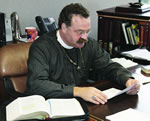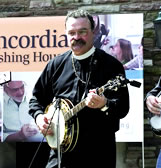by James H. Heine
Rev. Matthew C. Harrison was installed as the 13th president of The Lutheran Church–Missouri Synod Sept. 11. Several days before his installation, The Lutheran Witness sat down with President Harrison for a conversation about the LCMS, his new responsibilities, his family, and himself.
~~~
 TLW: We suspect the past few weeks have been a whirlwind. Have you had an opportunity to catch your breath?
TLW: We suspect the past few weeks have been a whirlwind. Have you had an opportunity to catch your breath?
MCH: Well, I have caught my breath on occasion. There has been a day or two here and there that we’ve taken a bit of rest. I moved a woodpile over the weekend, and that was very helpful–just slowly, slowly moving those logs from here to there gives one time to contemplate, think through things, settle down a bit.
TLW: Do you find that physical activity is a good opportunity to think and clear your mind?
MCH: Yes, physical activity is that for me, although I don’t do enough. I need to be more intentional about that.
I actually find great consolation in working with my hands. I build things. I’m a bit of a carpenter. I just built this over the last few weeks. [Harrison points to the cross in the photo accompanying this story.] It was a way to think about things while being distracted with my hands. I like sawdust, and wood is such a theological medium. It is First Article: It’s creation. It’s beautiful. It’s actually glorious. And Second Article: It has to die to reveal its beauty. It reminds one of Christ. And then, as a friend recently reminded me, it is the wood that has suffered the most tribulation in life, that is the most twisted and knotty and full of disease, etc., that reveals the most glorious grain and finish in the end. That is a profound reality. It’s a profound picture of the Christian life.
TLW: Do you think God had this in mind when He created the world–that we work with our hands like this?
MCH: Absolutely! Other people find meaning in many other things–golf and sports. I’ve done my share of that, too. But I find especially in church work, the closer you are to the ground, to the people who are in need, and delivering Law and Gospel to them, that it’s very rewarding to be right where people are, and right in their lives. It’s the greatest privilege. It’s also the greatest challenge sometimes. I think that having an outlet, but also vocationally to produce–I think it’s a big challenge in our world today because people have vocations where so often they don’t see tangible results. I always have the greatest respect for trades people and artists and those folks that kind of put the wire up around the fences and all that kind of stuff.
TLW: What has surprised you about your new position?
 |
|
President Harrison, an avid bluegrass fan, plays the banjo following his installation as the 13th president of the LCMS. |
MCH: I expected an outpouring of kindness from people. What has overwhelmed me is the number of people who are calling, who are writing letters, who are on Facebook, telling me they’re praying for me and the family, and praying for the church, and often people you might not have expected to do that. That has been overwhelming. And it’s such a profound thankfulness and humbleness that it elicits, that people would think it worthwhile to pray for me in this vocation. That really makes me feel that I’m not at all alone in this challenge, which is a wonderful comfort.
TLW: Do you think that anyone who is the president of The Lutheran Church–Missouri Synod, or of any large entity, can sometimes feel profoundly isolated? … Even in congregations, do pastors sometimes feel that way sometimes?
MCH: Absolutely. That’s why it’s so important in congregations–but also, I think, in this office–to be engaged. It’s so easy to be impersonal today–not to visit people, not to stop by their offices, not to actually get up and have a face-to-face conversation with somebody, to carry on your correspondence via e-mail even if you’re 20 feet apart in the same office. I think the same basic principle applies whether you’re a pastor or anybody else.
I had some great advice from a dear friend when I first got into the ministry. He said if you feel a sense of a problem with somebody, or there’s something that’s bothering you about another individual, you should not wait. You should go and speak to that person immediately. And I think the same applies on the flipside, too. If you’re pleased with that individual, or if you work with an individual, you should personally visit.
Now, it would take (I was calculating it the other day) if I visited one congregation in the Missouri Synod each weekend–well, it would take 120 years to visit them all. So, folks should pray for longevity in this office.
TLW: The convention mandated significant changes to the national structure of the LCMS. What might the local congregation, or the person in the pew, notice?
MCH: What we have to do is have a positive impact on the financial situation immediately. And we are in the process of really working through those things that need to remain and where the streamlining needs to take place. It’s going to be a very challenging–it is a very challenging process to contemplate. But we at the national level must simply learn to live within our means.
As we’ve begun to look at how to put the restructuring together (and a great lot of it depends on the president’s office in designing the structure that is responsible to the president), we’ve been really looking hard at the Bible and how the New Testament life of the church works. And so we’ve come up with a threefold emphasis of witness, mercy, and life together. And we’re really mining the New Testament on these three important aspects of New Testament life: sharing the Gospel; caring for people in need, both within and without the Church; and then living together in unity, in love, in doctrinal unity, and peace and harmony.
We’re approaching the whole restructuring from a very biblical viewpoint. I think there’s going to be a lot coming out that pastors and congregations will enjoy, get a hold of, love digging into the text, and see that they can also apply this locally.
TLW: If you could speak to every congregation face-to-face for 10 minutes tomorrow, what would you say to them, and what would you encourage every individual to do when they left that meeting?
MCH: Hmmm. I would tell them that they’re all damned sinners under the Law. Every last one of them deserves eternal death, and so do I. But by God’s gracious giving, He has saved us by the blood of Jesus. And He has brought them together, not by their own works or doing, but brought them, and all of us, together into the Church to live together and receive this grace and to live out this life together. And the Missouri Synod has a sacred vocation. We have been given such fantastic gifts! We are not the biggest, and we’ve got a million problems and challenges, especially as this country slips deeper into paganism. But we are called with the resources and capacities the Lord has given us and continues to give us, both here and everywhere around the world, to make a huge impact for the sake of the Gospel of Christ, particularly for confessional Lutheranism. And it’s our challenge in our day to do this. There’s nobody–nobody like the Missouri Synod and her partners who can bear witness ecumenically to sola scriptura, sola fide, sola gratia, solus Christus. That is our sacred task now–today! And we can do it only by God’s grace.
TLW: What has been the reaction of your family to your election as president to the LCMS?
MCH: “What, him?” You know, “We didn’t know he had that in him! Do they know the mistake they’ve made?” Actually, it’s been profound, and funny, too. I’m still Matt. My dad is still my dad, and my mother is still my mother, and I do not tell my mother what to do.
TLW: Near the end of our conversation in Houston, you said, “My garage is messy, and I need to get home and clean it up.” Has there been any progress on that front?
MCH: Thankfully, I’m happy to say yes. A great deal of progress has been made on that front. I used this move as an opportunity to ditch a lot of stuff–including a lot of books. I took quite a load of books to the seminary and gave them to students. So, yes, we made progress. But there’s always (as is the case of the Law), always more to do, and it’s never like it should be.
—
About the Author: James Heine (james.heine@lcms.org) is executive editor of The Lutheran Witness.
October 2010





